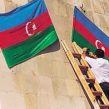
AZERBAIJAN’S MODERATE OPPOSITION ON THE EVE OF ELECTIONS
Publication: Eurasia Daily Monitor Volume: 2 Issue: 206
By:

Azerbaijan’s moderate opposition has been relegated to undeserved obscurity in terms of international media coverage and Western policy assessments of the situation in Azerbaijan. The attention has focused on the radicals because of their confrontational tactics and “revolutionary” phraseology. Meanwhile, the moderate opposition’s Yeni Siyasat (New Policy, YES) bloc is fielding candidates in 69 out of the 125 single-mandate electoral districts. Opposing any revolution for its destabilizing effects, the YES bloc calls for reforms through evolution and public accord.
The bloc’s main programmatic document, “Public Accord on Transition from Authoritarianism to Democracy,” calls for combating official corruption and the clan system, transferring some powers from the President to Parliament; and Azerbaijan’s integration into Euro-Atlantic structures. Such demands parallel those of the radical opposition in their content, but differ from it regarding strategy and tactics. Moreover, unlike the radical Azadliq bloc’s leaders, YES takes the position that evolutionary change is feasible in cooperation with the incumbent authorities, not in confrontation with them. YES leaders underscore the importance of building state institutions, and overcoming the syndrome of leader-oriented political parties.
Eldar Namazov, formerly a top political adviser to President Heydar Aliev, initiated the formation of the YES bloc in the spring of 2005 for this electoral campaign. Namazov had resigned from the presidential staff in 1999 and worked for think tanks since then, distancing himself equally from the authorities and the irreconcilable opposition.
Etibar Mamedov’s Milli Istiglal (National Independence, NIP) Party forms the nucleus of YES. One of the rare statesmanlike figures in the old Popular Front, Mamedov created the NIP in 1992, and was officially credited with 11.6% of the votes as the runner-up in the first round of the 1998 presidential election. He then placed fourth in the 2003 presidential election. As with Gambar in 2003 (see EDM, November 3, 2005), Mamedov’s 1998 score was reduced through fraudulent vote counting, but his defeat could not be doubted. Unlike Gambar, however, Mamedov did not declare victory, but only called for a runoff, and did not incite riots when he did not get the runoff. Meanwhile, the NIP has undergone a fragmentation process similar to that of other opposition parties (whether radical or moderate). NIP’s former vice-chairman, Nazim Imanov, is a candidate challenging Mamedov in the same electoral district. NIP retains the loyalty of the respected economist, former deputy prime minister Ali Masimov.
The strange and disquieting presence in the YES bloc is that of Ayaz Mutalibov, the last First Secretary of the Azerbaijan Communist Party Central Committee (1990-91) and for a few months the president of Azerbaijan (1991-1992). Mutalibov then found refuge in Moscow and was a suspected co-organizer of several of the abortive coups in Azerbaijan in the early and mid-1990s, for which he is still wanted for investigation by the authorities. Mutalibov used to have a political base in the countryside around Baku and in Apsheron peninsula villages. Whether his support for YES can still garner votes there, or whether he is channeling funds from Russia to the YES campaign, remains unclear. Mutalibov figures on the YES coordinating council alongside Araz Alizade, co-chairman of the small Social-Democrat Party and long an advocate of “third-road” (equidistant between Russia/Iran and the West) policies for Azerbaijan.
Outside the YES bloc, the Party of Democratic Reforms, led by parliamentary deputy Asim Molazade, also appeals to voters who favor evolutionary change in cooperation, not confrontation, with the authorities. Molazade is a staunchly pro-Western politician, with long-standing ties in Washington, and was the closest associate of Popular Front of Azerbaijan Party (PFAP) leader Ali Kerimli for many years. Molazade broke with the PFAP and Kerimli at the start of this electoral campaign because he disagreed with their confrontational tactics and choice of doubtful allies such as the Democratic Party of Rasul Guliyev.
(Survey based on election campaign coverage by the ANS, Turan, Trend, and AzerTaj news agencies and the ANSTV and ITV channels, as monitored by BBC’s Global Newsline, September-October 2005; see EDM, August 8, October 27, 28, November 1, 3)




